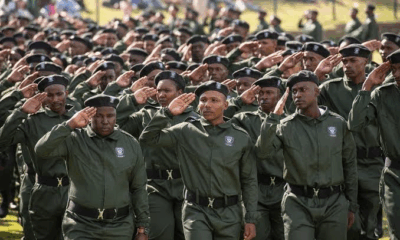News
Gauteng Doubles Down: AmaPanyaza Wardens Defended in Wake of Legal Challenge

Political Crossfire Over Provincial Law Enforcement
In Gauteng, a sharp debate is unfolding. The province’s Crime Prevention Wardens, popularly known as AmaPanyaza, are under fire following claims from a high-ranking police official that their existence is unconstitutional. But the Gauteng government is pushing back hard, declaring that the wardens aren’t just symbolic; they’re legally recognised peace officers and vital to public safety.
Mkhwanazi’s Challenge
Last week, KwaZulu-Natal Police Commissioner Lieutenant-General Nhlanhla Mkhwanazi addressed Parliament’s Ad Hoc Committee on policing and corruption. While he acknowledged that Premier Panyaza Lesufi probably acted with good intentions, he insisted the wardens are unlawful. His objections reportedly stem from a meeting of the Police Board of Commissioners, where he argued the structure wasn’t sanctioned under national law. Legal Services within SAPS, he claimed, supported his position.
Gauteng’s Rebuttal
Gauteng’s MEC for Community Safety, Jacob Mamabolo, responded forcefully. He pointed out that in December 2023, then-Justice Minister Ronald Lamola formally designated the wardens as peace officers under Section 334 of the Criminal Procedure Act. That legal move, Mamabolo argues, gives them equivalency to provincial traffic officers, legitimising their role in crime prevention.
Mamabolo didn’t shy away from heralding the wardens’ performance. He described them as “force multipliers” working in coordination with SAPS, the Gauteng Traffic Police (including its air wing), the Directorate for Priority Crime Investigation (DPCI), and private security players. He urged more recognition for what he says the unit is already achieving in the field, especially in townships, informal settlements, and areas where police visibility is low.
How It Fits in Gauteng’s Crime Strategy
While the wardens are controversial, they are just one piece of a broader provincial safety plan. Mamabolo emphasised integrated operations: intelligence-led policing, aerial surveillance, and cross-agency collaboration. He also affirmed that the Gauteng government remains committed to working across departments to improve public safety and service delivery in crime-hit areas.
Public Sentiment and Political Pressure
Public opinion is mixed. Proponents see AmaPanyaza as a fresh, proactive push toward local safety solutions. Critics warn of accountability risks and constitutional overreach. The Democratic Alliance (DA) in Gauteng, for instance, has demanded clarity from Lesufi on the legal basis for the wardens. Media commentary suggests this clash won’t fade quietly; it speaks to how provincial power, policing, and community safety intersect in South Africa today.
This is more than a local skirmish. It’s a debate about governance, provincial authority, and who holds the right to enforce law and order across city streets. For now, Gauteng has staked its claim: AmaPanyaza are legitimate. The courts or national oversight bodies may yet decide otherwise, but the debate is here and now.
Also read: Senzo Mchunu Clarifies: Political Killings Task Team Was Never an Official SAPS Unit
Follow Joburg ETC on Facebook, Twitter, TikT
For more News in Johannesburg, visit joburgetc.com
Source: IOL
Featured Image: Inside Metros



























